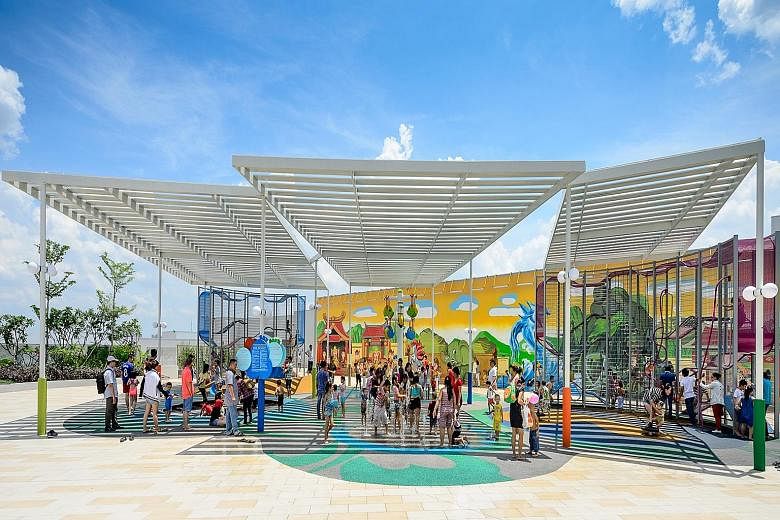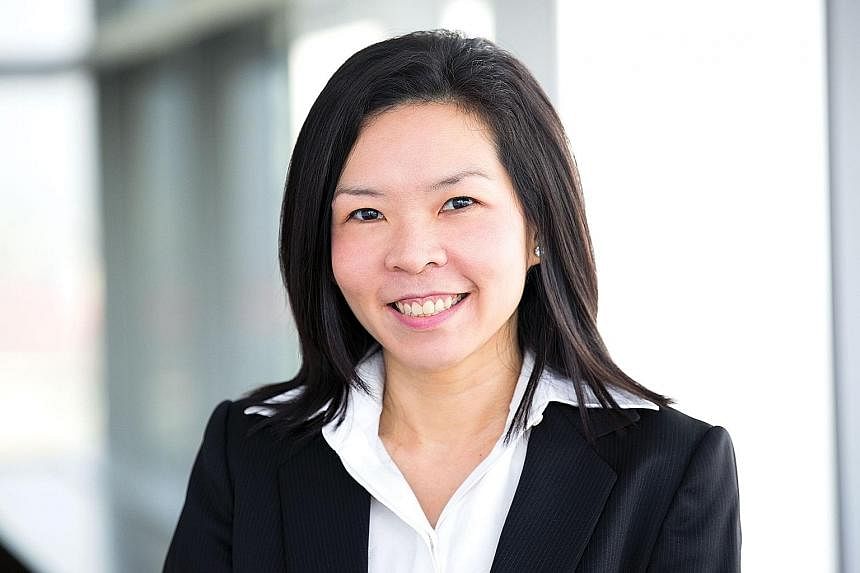HO CHI MINH CITY • Real estate in Vietnam is at a different stage in the property cycle from the rest of South-east Asia and there are signs that the market is turning, according to Mapletree Investments' chief executive officer for the region.
The real estate company officially opened SC Vivocity yesterday, its first shopping mall in the country, and is working on a possible second integrated development in Ho Chi Minh City, Ms Wendy Koh said at an interview on Saturday.
"Vietnam is seeing fairly strong economic growth, especially compared with the rest of South-east Asia. Income growth is strong with rising urbanisation and foreign direct investments," she noted.
"(Property prices) in Vietnam have hit bottom and we are beginning to see some recovery."
Yesterday's ceremony was attended by Vietnam's President Truong Tan Sang.
Mapletree first entered the Vietnam property market in 2005 in the logistics sector. It expanded into industrial parks, acquiring Pacific Place in Hanoi - a mixed development with office, retail and serviced apartments - and office building CentrePoint in Ho Chi Minh City.
SC Vivocity is the first phase of Saigon South Place, a 4.4ha integrated mixed-use development in Ho Chi Minh City. It is being developed by a joint venture between Mapletree Investments and Saigon Co.op Investment Development Joint Stock Company (SCID), an affiliate of Vietnam retailer Saigon Co.op.
Saigon South Place will also comprise Grade A office and serviced apartment buildings. The first office block, which will have close to 30,000 sq m in gross floor area, has seen an encouraging number of enquiries and should be completed by the end of next year.
Mapletree aims to start constructing the serviced apartments, which will total more than 400 units, early next year, and complete them in 21/2 more years. They will be operated by Oakwood Asia Pacific, in which Mapletree took a 49 per cent stake last year.
Ms Koh said it is also negotiating and actively pursuing opportunities in Ho Chi Minh City as well as other cities in Vietnam. It is considering office and residential projects, and is open to both completed assets and development assets on a selective basis.
What is Mapletree's value proposition in Vietnam? Looking at SC Vivocity, which has been operating since April, Ms Koh noted it is a lifestyle mall. For example, Vietnamese with young children enjoy the wet and dry playground on the roof deck - the first such park in Vietnam - and the mall has Vietnam's first Imax theatre as well.
"Generally, the Vietnamese quite like the idea of having a Singapore-style mall here... Other malls are focused on fashion and dining, but SC Vivocity is a one-stop family lifestyle mall."
The mall, which has committed close to 90 per cent of its 41,000 sq m net lettable area, gets footfall of about 700,000 visitors monthly. "Relative to other malls, we are happy with the footfall," said Ms Koh. (See correction note below)
New-to-market brands at the mall include toy store Hamleys, which will be opening soon, fashion retailers Miss Selfridge and Dorothy Perkins, as well as Singapore musical instruments retailer and distributor Swee Lee.
A representative of the Ho Chi Minh City Committee said at yesterday's opening that foreign investments such as Mapletree's are crucial for the city. Foreign investments will account for 24.5 per cent of the city's economy by the end of this year, he said.
Singapore is also one of five countries with the largest investments there, with about 719 projects worth US$8.2 billion (S$11.5 billion) by Singapore firms so far.
Mapletree's yields for its projects in the country range from mid single digits to "high teens", depending on location and property cycle. As in Singapore, yields tend to be higher for industrial property but asset values are smaller.
"We tend to look on a total returns basis. For investment assets in Vietnam, it is in the mid teens, and for development property, over 20 per cent, both over three to five years," Ms Koh said.
While there was some intention for a Vietnam-focused private equity fund several years ago, market conditions were not ideal but this could happen as the appetite for investments into Vietnam picks up.
"We are always open to opportunities, whether it's a Vietnam-focused private fund, South-east Asia-focused private fund, or eventually a South-east Asia real estate investment trust," said Ms Koh.
"Apart from having the right assets, there needs to be strong appetite from investors," she added. "Only then will we consider setting up a fund. Details will need to be explored further."
As for other parts of South-east Asia, Mapletree is winding down its Malaysia-focused closed-end private fund CMREF1, which has already hit maturity. It has three residential projects in partnership with another developer as well.
It is looking "very selectively" at office buildings in Malaysia too.
It has been actively looking in the Philippines and is taking a wait-and-see approach in Indonesia, given very steep asset inflation in Jakarta over the past few years.
Mapletree is focused on office assets in the potential new markets.
"For new markets, we try to focus on investment assets if possible and will also explore serviced apartments as investment assets," said Ms Koh. "Until we have acquired a new asset, we will pursue development assets only on a very selective basis."
Mapletree's South-east Asia business unit had about $687.9 million in assets under management as at the end of the 2014 financial year, with a target to hit $1.5 billion to $2 billion by 2019.
"But as a group, we don't grow for the sake of growing; the key thing when you make an investment is for returns," said Ms Koh.
Vietnam accounts for the bulk of Mapletree's South-east Asian business, outside Singapore now, but it is hard to say whether this will always be the case, she added.
"It depends on market conditions and what is important is to be able to respond to market conditions. But Vietnam will remain an important part of South-east Asia for us," Ms Koh said.
CORRECTION: An earlier version of this story had erroneously stated that footfall for SC Vivocity is 70,000 a month. This is incorrect. It should be 700,000 a month. In our picture caption and subheading, we had referred to the mall as the first in Vietnam. This is incorrect. It is Mapletree's first mall in Vietnam. We are sorry for the error.



